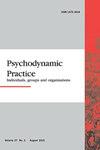Figures of the body in a situation of exile : the European case
IF 0.4
Q4 PSYCHOLOGY, CLINICAL
引用次数: 0
Abstract
The purpose of this article is to establish dialogue between psychoanalysis, social sciences (philosophy, anthropology, sociology) and politics to analyse the way in which current migratory policies, impact on the bodies exiled peoples who seek to establish themselves in safe territories. This article will look at the ways in which the body of the exiled person is affected by the political, and how they embody the place of a subjective suffering. Different figures of the migrant subject’s body will be discussed. The data comes from varied ethnographic research conducted in France (‘Calais Jungle’, accommodation centres and administrative detention centers). Our interpretations will demonstrate how this body in the process of transit, which swings between extremes of mobility and immobility, appears damaged, wounded, or even at risk of becoming ‘human-refuse’. We will also see that it can be instrumentalised, measured, evaluated, by the institutions that receive it. This body in a state of exile wavers continuously between fragility, vulnerability and destructivity; but it can also, on occasion, show itself to be powerful and life-saving. Indeed, it harbours a surprising strength, and is capable of crossing borders and territories to which it has been forbidden entrance. Thus, it bears witness to the intensity of the human drive to live, even when put to the test of segregational migratory policies.流亡状态下的身体形象:欧洲案例
本文的目的是建立精神分析,社会科学(哲学,人类学,社会学)和政治之间的对话,以分析当前的移民政策对寻求在安全领土上建立自己的流亡人民的影响方式。本文将探讨流亡人士的身体如何受到政治的影响,以及他们如何体现主观痛苦的地方。将讨论移民主体身体的不同形象。这些数据来自在法国进行的各种人种学研究(“加莱丛林”、住宿中心和行政拘留中心)。我们的解释将展示这个身体在移动和静止的极端之间摇摆的过程中是如何受损、受伤的,甚至有成为“人类垃圾”的危险。我们还将看到,接受援助的机构可以将其工具化、衡量和评估。这个处于流亡状态的身体不断地在脆弱、脆弱和破坏性之间摇摆;但有时,它也能显示出自己的强大和拯救生命的能力。事实上,它拥有惊人的力量,能够跨越被禁止进入的边界和领土。因此,它证明了人类生存的强烈动力,即使受到种族隔离移民政策的考验也是如此。
本文章由计算机程序翻译,如有差异,请以英文原文为准。
求助全文
约1分钟内获得全文
求助全文
来源期刊

Psychodynamic Practice
PSYCHOLOGY, PSYCHOANALYSIS-
CiteScore
0.90
自引率
0.00%
发文量
41
期刊介绍:
Psychodynamic Practice is a journal of counselling, psychotherapy and consultancy and it is written for professionals in all fields who use psychodynamic thinking in their work. The journal explores the relevance of psychodynamic ideas to different occupational settings. It emphasizes setting and application as well as theory and technique and focuses on four broad areas: •Clinical practice •The understanding of group and organisational processes •The use of psychodynamic ideas and methods in different occupational settings (for example, education and training, health care, social work, pastoral care, management and consultancy) •The understanding of social, political and cultural issues
 求助内容:
求助内容: 应助结果提醒方式:
应助结果提醒方式:


